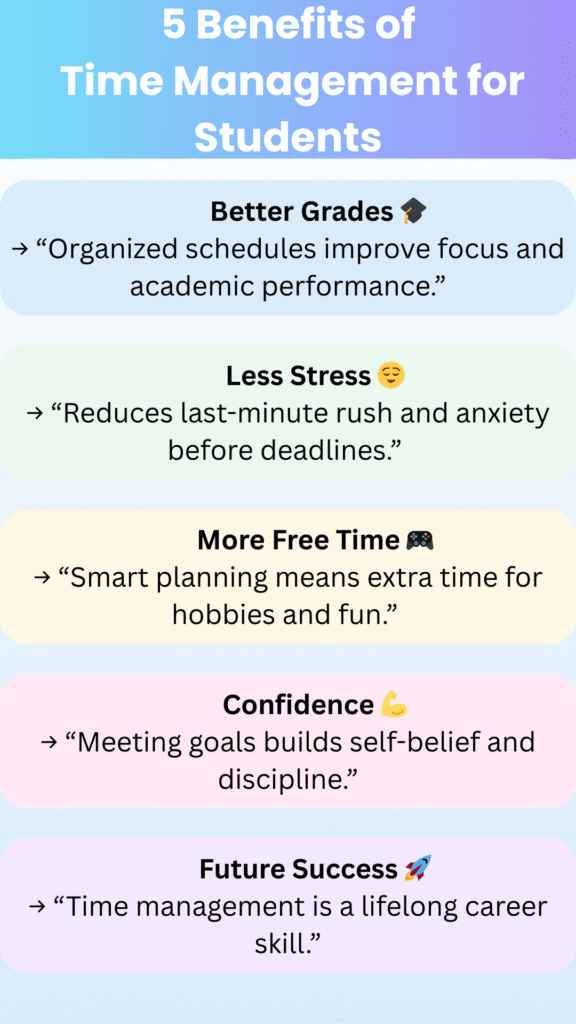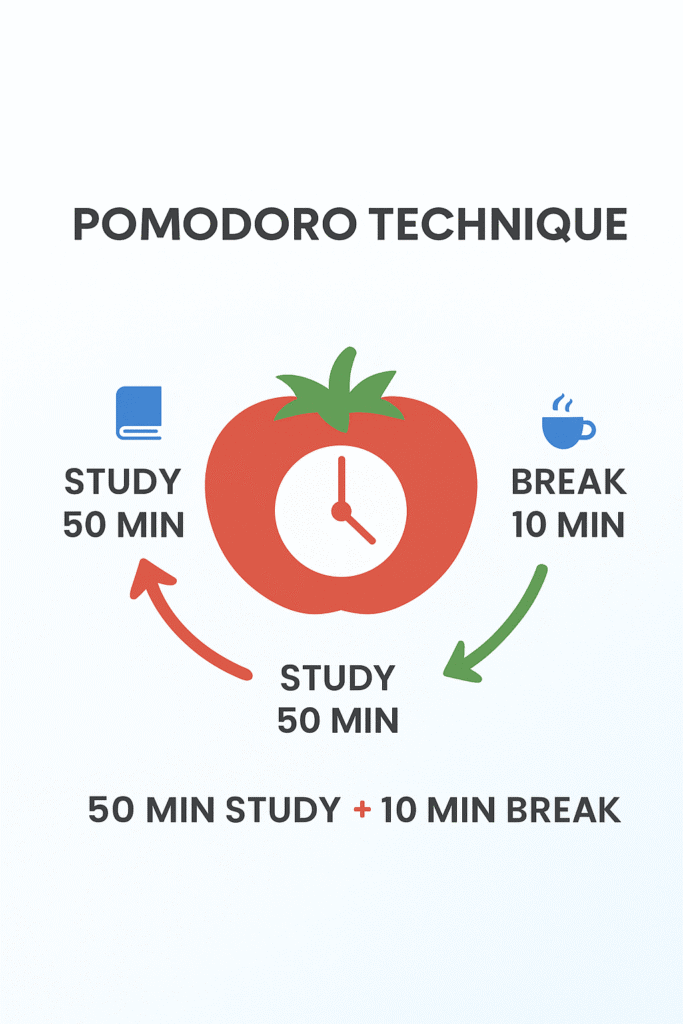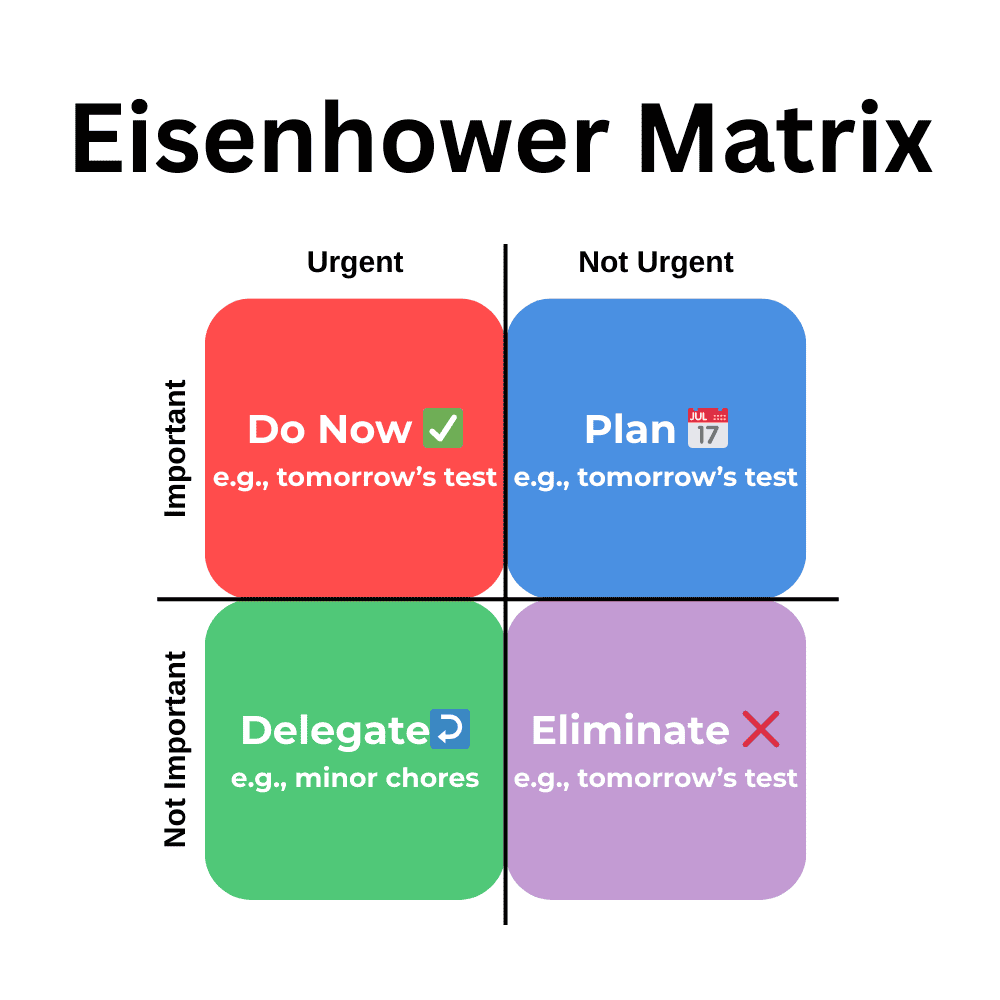The importance of time management for students goes beyond academics. Research shows students who manage their time score 20% higher. yet very few ever learn how to manage their time properly.
Ever stayed up all night before an exam, only to realize you wasted weeks scrolling your phone instead of studying? You’re not alone; most students face this exact struggle.
That’s why, in this complete guide on the importance of time management for students, you’ll discover proven techniques, practical planners, and real-life strategies to take control of your time and your success.
Here’s a quick look at what you’ll learn in this guide:
- ✅ Understanding what is time management in student life and why it makes all the difference.
- ✅ Key benefits of time management higher grades, lower stress.
- ✅ Simple steps to build a study timetable that actually works.
- ✅ Smart techniques for exams, long study sessions, and daily routines.
- ✅ The value of time in student life and how to make every hour count.
No matter if you’re gearing up for exams, finding it hard to concentrate, or just craving more balance, this guide will show you why mastering time is the secret to mastering life.
So, let’s begin with the basics: what exactly is time management, and why is it the single most valuable skill in a student’s life?

What is Time Management for Students?
At its core, time management is the skill of planning, organizing, and using your time wisely to achieve the best results with the least stress. For students, time management isn’t just about finishing homework it’s about building habits that help you do well in studies and life.
💡 Examples of time management for students.
Imagine two students preparing for the same exam.
- Aarav creates a study plan. He studies for 2 hours every evening, finishes his syllabus step by step, and still gets time to relax.
- Rohit keeps delaying his studies. He spends hours on Instagram, wastes days, and then pulls an all-nighter before the exam.
Both had the same 24 hours, but how they managed it made all the difference. That’s why the importance of time management for students cannot be ignored.
Check out these 10 Good Habits for Students
Importance of Time Management in Student Life
The importance of time management for students goes far beyond just finishing assignments on time. Time is like money for students—if you waste it, it never returns. Managing it well is one of the best skills you can learn.
If you ask any successful student what their “secret” is, you’ll rarely hear “I studied all night.” Instead, you’ll hear:
👉 “I managed my time well.”
📊 Research-backed truth: A 2021 meta-analysis in Frontiers in Psychology reveals that strong time management skills are linked to better academic performance (with a correlation of 0.39, explaining roughly 15% of academic success) and lower stress levels, helping students unlock their full potential. [Source: Hayat et al., 2021, Frontiers in Psychology]
This proves the value of time in student life goes far beyond meeting deadlines—it directly impacts grades, focus, mental health, and even overall happiness.
Why Time is Important for Students
- Better Academic Performance: Planned study sessions mean more retention and less last-minute cramming.
- Sharper Focus & Productivity: Prioritizing tasks reduces distractions and improves concentration.
- Lower Stress & Anxiety: Managing workload prevents panic and supports mental health.
- Balanced Student Life: Enough time for studies, hobbies, rest, and friends.
- Foundation for Future Success: Time management builds discipline, confidence, and strength that help you not just in school but in life too.
👉The importance of time management for students isn’t just about academics; it’s about learning how to use your 24 hours to create balance, reduce stress, and achieve success in every area of life.
Key Advantages of Time Management That Boost Student Life
When it comes to student success, the advantages of time management are impossible to overlook. It’s not just about “getting more done”, it’s about studying smarter, reducing stress, and creating space for a balanced life.
And here’s the kicker: students who don’t manage their time often work harder but achieve less.
Top Advantages of Time Management for Students
- Higher Productivity: A proper schedule helps you finish tasks faster without wasting time.
- Less Stress & Anxiety → No more last-minute panic before deadlines.
- Better Academic Results → Consistent study builds stronger grades.
- Improved Focus → Clear priorities = no wasted energy on distractions.
- Work–Life Balance → Time for hobbies, friends, and self-care.
- Confidence Boost → Being in control of your day builds self-belief.
- Future-Ready Skills → Time management today = career success tomorrow.
📊With Time Management vs Without Time Management
| With Time Management | Without Time Management |
|---|---|
| Calm, organized ✅ | Stressed, rushing ❌ |
| Focused study → Better retention 🎯 | Distracted study → Poor results 📉 |
| Balance between studies & free time ⚖️ | Overwhelmed, no time for hobbies 😓 |
| Higher grades, stronger confidence 📈 | Lower performance, self-doubt ❌ |
👉 The advantages of time management aren’t just academic. They’re emotional, mental, and even social. If you’re serious about success in school (and beyond), learning to manage your time is the single best investment you can make.
Disadvantages of Poor Time Management for Students
When we talk about time management advantages and disadvantages, it’s clear that students who don’t manage their time pay a heavy price. While the advantages of time management are endless (better grades, less stress, more balance), ignoring it creates invisible costs that pile up over time.
🔴 Key disadvantages of time management in student life.
- Missed Deadlines & Low Grades – Constantly rushing means assignments are late or incomplete.
- High Stress & Burnout – All-nighters may feel productive but eventually drain your energy and health.
- Weak Focus & Productivity – Wasting hours on distractions leads to poor results despite “studying all day.”
- Loss of Confidence – Repeated failures hurt self-esteem and create a cycle of procrastination.
Time Management: Advantages and Disadvantages for Students
What are the advantages of time management?
- Finish tasks on time ✅
- Higher grades and better focus 📈
- Balanced study and rest ⚖️
- Improves confidence and discipline 💪
What are the disadvantages of time management?
- Missed deadlines ❌
- Lower grades and last-minute cramming 📉
- Burnout and stress 😓
- Anxiety and self-doubt 😟
| Time Management Advantages | Time Management Disadvantages |
| Finish tasks on time ✅ | Missed deadlines ❌ |
| Higher grades & focus 📈 | Lower grades & cramming 📉 |
| Balanced study + rest ⚖️ | Burnout & stress 😓 |
| Confidence & discipline 💪 | Anxiety & self-doubt 😟 |
👉 While the advantages of time management help students achieve balance, productivity, and success, the disadvantages of time management can derail academic growth and mental well-being. The choice is simple: manage your time, or let it manage you.
Essential Time Management Skills for Students
If you want to truly unlock the advantages of time management, it’s not just about using planners or apps. The real difference comes from mastering a set of time management soft skills and mental habits that keep you disciplined, focused, and productive.
Think of these skills as the engine behind every schedule or study plan. Without them, even the best planner won’t save you.
✅ Here are the core time management soft skills for students (master these, and you’re ahead of 90% of your peers):
1. Prioritization (The 80/20 Rule in Action)
👉 Figure out the 20% of study tasks that give you 80% of your marks.
- High-value tasks first → exams, assignments, projects.
- Low-value tasks later → scrolling, gaming, busywork.
Power Tip: Each morning, choose 3 study goals you must finish. Everything else is secondary.
2. Planning (Your Daily Roadmap)
👉 Planning helps you stay on track instead of feeling lost.
- Weekly study plan → breaks syllabus into chunks.
- Daily schedule → blocks time for focus and rest.
Power Tip: Use the time-blocking method → assign hours for each subject/activity.
3. Focus & Concentration (Deep Work Mode)
👉 Multitasking kills productivity. Focus is your superpower.
- Study in Pomodoro cycles (25 min study + 5 min break).
- Switch off notifications → protect your brain’s attention span.
Power Tip: Create a “no-distraction zone” (library, quiet corner, or even airplane mode).

4. Discipline & Consistency (The Non-Negotiable Skill)
👉 Time management isn’t about doing big things once; it’s about showing up daily.
- Build small daily study habits.
- Stick to your schedule even when motivation is low.
Power Tip: Pair habits (study + reward). Do 60 minutes of study, then relax for 10 minutes online.
5. Stress Management (Balance = Sustainability)
👉 Burnout destroys both focus and grades.
- Sleep 7–8 hours.
- Exercise, journal, or meditate.
- Build relaxation into your planner.
Power Tip: Treat rest as part of your study plan, not a luxury.
[FREE PDF] Time Management Skills Checklist Every Student Needs
Want a ready-to-use cheat sheet of these skills? I’ve created a free downloadable PDF checklist that you can save, print, or pin on your wall.
It covers:
- ✅ 5 essential time management soft skills
- ✅ Daily/weekly planner templates
- ✅ Self-assessment questions to track progress
🔑 The importance of time management in students’ lives comes down to mastering these core soft skills. Tools change, apps change—but once you learn how to prioritize, plan, focus, stay disciplined, and manage stress, you can apply them anywhere in life.
👉Want better grades, less stress, and more balance? Start by building these time management skills one day at a time.
Best Time Management Techniques for Students
Now that you know the importance of time management for students, the next step is applying it with the right techniques. Instead of guessing or copying random hacks, use these proven, research-backed methods that top students (and even CEOs) rely on.
Ever thought, “What are the best time management techniques for students?” Let’s break them down for you:
1. The Pomodoro Technique (Best for Focus & Avoiding Burnout)
Study in 25-minute sessions, followed by a 5-minute break. After 4 rounds, take a longer break (15–30 mins).
✅ Pros: Boosts focus, prevents fatigue.
❌ Cons: Not ideal for long reading/writing tasks.
2. Eisenhower Matrix (The Quadrant Method)
A decision-making tool that sorts tasks into 4 categories:
- Urgent & Important → Do now (e.g., tomorrow’s test).
- Important, Not Urgent → Break them into steps and plan (e.g., long-term project).
- Urgent, Not Important → Delegate (e.g., minor chores).
- Not Urgent & Not Important → Eliminate (e.g., endless scrolling).
✅ Pros: Builds clarity on what truly matters.
❌ Cons: Requires honest self-assessment (easy to misjudge).
3. The 80/20 Rule (Pareto Principle)
Concentrate on the 20% of efforts that bring 80% of outcomes.
- Example: Reviewing class notes (20%) may lead to better retention than rereading the entire textbook (80%).
✅ Pros: Saves time, maximizes efficiency.
❌ Cons: Can be hard to identify the “vital 20%” at first.
4. Time Blocking (Scheduling with Intent)
Assign fixed time slots for each activity (study, exercise, rest).
- Example: A sample routine could be evening study slot, then dinner, and finally a short revision session before bed.
✅ Pros: Creates structure, eliminates guesswork.
❌ Cons: Can feel rigid if unexpected tasks pop up.
Quick Comparison: Best Time Management Techniques for Students
| Technique | Best For | Pros (✔) | Cons (❌) |
|---|---|---|---|
| Pomodoro | Short study bursts | Boosts focus, prevents burnout ✔ | Not ideal for deep writing ❌ |
| Eisenhower Matrix | Prioritization & decision-making | Helps separate urgent vs important ✔ | Needs discipline to apply ❌ |
| 80/20 Rule | Maximizing efficiency | Saves time, higher results ✔ | Hard to identify 20% tasks ❌ |
| Time Blocking | Structuring daily routine | Creates balance & order ✔ | Can feel rigid ❌ |
There’s no one-size-fits-all method. The best time management techniques for students depend on your study style:
- Struggle with focus? → Try Pomodoro.
- Always overwhelmed? → Use the Eisenhower Matrix.
- Want maximum results in less time? → Apply the 80/20 Rule.
- Need balance between studies & life? → Go with time blocking.
👉Master even one of these, and you’ll start experiencing the real advantages of time management: higher grades, less stress, and more free time.
Time Management Quadrant for Students (Eisenhower Matrix)
If you constantly feel like there’s too much to do and not enough time, the Time Management Quadrant (also called the Eisenhower Matrix) will change the way you study forever.
👉Why? Because it shows you exactly what to do first, what to plan, what to delegate, and what to ignore so you stop wasting hours on things that don’t matter.
The 4 Quadrants Explained (Student-Friendly Breakdown)
Quadrant I: Urgent + Important (Do First ✅)
Examples:
- Tomorrow’s assignment is due at midnight.
- Preparing for a surprise test.
🔑 Tip: Limit how often you land here—it’s where stress lives.
Quadrant II: Important but Not Urgent (Schedule It 📅)
Examples:
- Preparing for exams weeks in advance.
- Daily exercise or skill development.
🔑 Tip: This is the success zone. The more hours you invest in this area, the better your marks and overall balance become.
Quadrant IV: Not Urgent + Not Important (Eliminate ❌)
Examples:
- Binge-watching Netflix the night before an exam.
- Scrolling Instagram for hours.
🔑 Tip: The trap zone. Learn to say no here.
Time Management Quadrant Chart
| Quadrant | Urgent | Not Urgent |
|---|---|---|
| Important | Quadrant I → Do Now ✅ | Quadrant II → Plan 📅 |
| Not Important | Quadrant III → Minimize/Delegate 📲 | Quadrant IV → Eliminate ❌ |

📌 Action Step: Download our printable Time Management Quadrant template (PDF) and use it to plan your week. Stick it above your study desk to remind yourself where your time should really go.
💡 Why the Quadrant Works for Students
- Cuts down last-minute cramming stress.
- Helps you separate real priorities from distractions.
- Builds habits of planning ahead (Quadrant II = long-term success).
- Trains you to value time, proving why time is important in student life.
🔑 The Time Management Quadrant is more than a productivity hack; it’s a student life blueprint. If you apply it consistently, you’ll experience the true advantages of time management: less stress, higher grades, and more free time for hobbies and friends.
👉 Pro tip: Print the quadrant, fill it out every Sunday evening, and you’ll always start your week knowing what really matters.
Time Management for Exams: Study & Write Smarter
Exams aren’t just about how much you study; they’re about how well you manage your time before and during the test. Students who master exam-time planning often score higher without studying longer hours.
👉In this section, you’ll learn:
- ✅ A pre-exam time management checklist to organize your revision.
- ✅ Easy ways to divide your exam time so every type of question gets enough attention.
✅ Smart hacks to study longer without losing focus.
Pre-Exam Time Management Checklist
Before the exam even begins, how you plan your study time can make or break your performance.
Here’s a quick checklist every student should follow:
- Create a Revision Calendar → Allocate topics by day, finish tough subjects first.
- Use Mock Tests & Timed Practice → Train yourself to write within the time limit.
- Prioritize Weak Areas → Spend extra hours where your confidence is low.
- Organize Notes & Summaries → Keep formula sheets, key points, and flashcards ready.
- Sleep & Nutrition Plan → Your brain needs energy as much as your books do.
🔑 Pro Tip: Most toppers revise in 3 rounds: first for coverage, second for understanding, and third for speed & accuracy.
During Exam: How to Manage Time in Exams
Once the paper is in front of you, the real game is how you split your time.
The Time-Split Method
- Step 1: Scan Paper Quickly (5 minutes)
→ Mark easy vs. tough questions. - Step 2: Start with Easier Questions
→ Builds confidence and saves time. - Step 3: Allocate by Marks (Golden Rule)
- MCQs: 1 min each
- Short answers: 3–5 min
- Long answers/essays: 15–20 min
- Step 4: Keep 10 Minutes at End for Review
→ Check for silly mistakes and skipped questions.
📊 Example: If your exam is 3 hours →
- Section A (MCQs) → 30 minutes
- Section B (Short answers) → 60 minutes
- Section C (Essays/long answers) → 80 minutes
- Review → 10 minutes
Following this method helps you complete the exam within the given time limit.
How to Study for a Long Time (Without Losing Focus)

Studying for 6–8 hours straight sounds impressive, but without the right approach, it leads to exhaustion. Instead, use these focus-maximizing tips:
- Pomodoro + Long Study Hybrid → Study for 50 minutes, relax for 10 minutes, and repeat. After 3 cycles, take a longer 30-min rest.
- Hydration & Snacks → Drink water and eat brain foods (nuts, fruits) to keep energy stable.
- Active Study, Not Passive → Solve past papers, teach concepts out loud, or use flashcards.
- Study Zone Setup: Quiet space, no phone, and good lighting = less distraction.
- Mind-Body Balance → Light stretching or a short walk boosts concentration during long sessions.
👉 Remember: The goal isn’t “studying more hours” but studying smarter in the hours you do have.
Effective time management in exams is a two-part formula:
- Before the exam → Plan with a checklist and timed revision.
- During the exam → Use time-split strategies to maximize marks.
And if you’re wondering “how to study for a long time,” the secret is balancing short breaks, hydration, and active learning. That’s why the importance of time management for students extends beyond daily life; it’s the make-or-break factor when it comes to exam success.
Practical Tools: Charts, Schedules & Planners
Here’s the truth: reading about the importance of time management for students is only half the battle. The real challenge is actually sticking to a routine every day. That’s where tools like charts, schedules, and planners make a huge difference.
Instead of guessing “What should I study today?”, these tools give you clarity and structure so you can focus on learning, not stressing.
👉In this section, you’ll get:
- ✅ A sample time management chart for students (daily routine).
- ✅ A student-friendly hourly planner for exam days.
- ✅ A weekly timetable template to balance study and fun.
- ✅ A free time management PDF for students you can download, print, and use right away.
Time Management Chart for Students
Think of this as your map for the day. A simple chart helps you see how much time you’re actually giving to studies, rest, and free time.
Example Daily Schedule (Student Version):
🌅 Morning Power Hours (6:30 AM – 10:00 AM)
- ⏰ 6:30–7:30 AM → Wake up and exercise
- 📚 7:30–10:00 AM → Prioritize studying your toughest subject.
Pro Tip: Drink water first thing, and do a quick stretch or yoga to energize your brain and body.
Why it works: The brain is sharpest in the morning. Tackle tricky topics first—math, physics, or any subject you find challenging.
🍵 Mid-Morning Recharge (10:00 AM – 10:30 AM)
Snack or tea break. Fuel up without overloading.
Mini Hack: Keep it healthy—fruits, nuts, or a light sandwich.
📖 Morning Revision Time (10:30 AM – 12:30 PM)
Complete homework and revise notes.
Focus Tip: Use the Pomodoro method—50 minutes of focus + 10 minutes of break—to avoid burnout.
🛋️ Lunch & Rest (12:30 PM – 1:30 PM)
Eat balanced, rest, and recharge.
Pro Tip: Avoid heavy meals that make you sleepy. A short walk or light music works wonders.
📚 Afternoon Practice (1:30 PM – 3:30 PM)
Solve practice questions, mock papers, or previous year exam papers.
Power Hack: Focus extra time on weak areas—that’s where most marks are gained!
🎨 Hobby/Free Time (3:30 PM – 4:30 PM)
Play cricket, draw, practice a hobby, or relax.
Pro Tip: Reward yourself for completing morning and afternoon study goals.
📚 Evening Revision & Homework (4:30 PM – 6:30 PM)
Revise everything studied earlier; finish pending homework.
Quick Tip: Teach the concept to yourself—it’s proven to improve retention.
🍽️ Dinner (6:30 PM – 7:30 PM)
Keep it light and healthy. Avoid distractions during mealtime.
🌙 Night Wrap-Up (7:30 PM – 8:30 PM)
Quick review and plan for the next day.
Pro Tip: Write 2–3 high-impact tasks for tomorrow—start strong!
👉 Use this as a base template and tweak it for your own school/college timings.
⏰ Hourly & Weekly Planners (Student Edition)
- Hourly Planner → Breaks down your study day into focused blocks (great for exam prep).
- Weekly Planner → Lets you track classes, homework, and weekend plans at once.
📥Both are included in the Free Time Management PDF for Students below.
📥 Free Download: Time Management PDF for Students
No need to design your own planner. We’ve created ready-to-use templates:
✔ Daily Time Management Chart
✔ Hourly Study Planner
✔ Weekly Timetable
✔ Blank version (so you can customize your schedule)
👉 Click below to grab your copy, print it, or edit it on your phone/laptop.
Time management in student life becomes a lot easier when you don’t rely on willpower alone. Using planners and charts keeps you consistent, motivated, and on track so you spend less time worrying and more time winning.
The Value of Time in Student Life (Why Every Hour Matters)
We all get the same 24 hours. But how you spend each hour defines your success. For students, the value of time in student life isn’t just about finishing homework; it’s about laying the foundation for your entire future.
Think of it this way:
- Every wasted hour is a missed chance to grow.
- Each focused hour brings you closer to your goals.
👉 That’s why mastering the importance of time in students’ lives early on is the key to better grades and personal growth.
Why Time Is the Most Valuable Asset for Students
- Grades Fade, Skills Remain
The hours you invest in learning today stay with you forever. - Lost Time Never Comes Back
Money, marks, and even opportunities can be regained. Time can’t. - Builds Character Beyond the Classroom
Discipline, punctuality, and focus, all rooted in time management, prepare you for real-world success. - Balances Present & Future
Managing your time well lets you enjoy student life today while building a successful future.
📊 A Quick Perspective
| Factor | ✅ With Time Value | ❌ Without Time Value |
|---|---|---|
| Academic Performance | ✅ Steady progress | ❌ Poor grades |
| Stress Level | ✅ Lower stress | ❌ Panic mode |
| Confidence | ✅Higher confidence | ❌ Overlooked goals |
| Future Preparation | ✅Better future readiness | ❌ Disappointment |
💡 Life Lesson for Students
Ask yourself every evening:
👉 “Did I spend my time today moving closer to my goals or further away?”
The importance of time management for students lies in this daily reflection. Success doesn’t happen in a day; it’s created one hour at a time.
The value of time in student life is more than just a study tip; it’s a mindset. If you learn why time is important and respect every hour, you’re not just preparing for exams; you’re preparing for life.
Conclusion on Time Management for Students (Final Thoughts)
When it comes to time management for students, the message is clear: time is your most valuable resource. How you use each hour today will determine your success, growth, and the person you become in the future.
✅ Quick Recap (Advantages of Time Management):
- Better grades without last-minute panic 📚
- More focus and productivity 🎯
- Reduced stress and stronger mental health 💆
- Balanced student life ⚖️
- A foundation for lifelong success 🚀
👉That’s the conclusion of time management: if you master your time, you master your future. The importance of time in student life isn’t just about academics; it’s about building discipline, confidence, and freedom that lasts a lifetime.
💡Don’t just read—act. Download our free [Time Management Planner PDF], apply these strategies, and share this guide with a friend who needs it.
At the end of the day, the conclusion on time management is simple: you can’t stop time, but you can decide how to spend it. Master your time, and you’ll master your life.
FAQs on Time Management for Students
1. What is the Importance of Time Management in Students’ Life?
The importance of time management for students is clear: it helps improve grades, lowers stress, and creates a balanced daily routine. Students who plan and use their time wisely not only achieve academic success but also grow personally and build habits that last a lifetime.
2. Why Time Is Important for Students
Time is a resource you can never recover. In a student’s life, using every hour effectively brings you closer to your academic and personal goals. On the other hand, wasted time can lead to lower grades, missed opportunities, and unnecessary stress.
3. What are the advantages of time management?
The advantages of time management include:
1. Higher productivity 📈
2. Lower stress 😌
3. Better focus 🎯
4. Balanced life ⚖️
5. Stronger future foundation 🚀
4. What Are the Disadvantages of Poor Time Management?
When students fail to manage their time effectively, the consequences can be serious. Common disadvantages of time management include missed deadlines, lower academic performance, increased stress, procrastination, and an unbalanced daily routine.
5. How to download a time management PDF for students?
Many institutes and websites offer free templates. We’ve created a [Time Management Skills PDF] (checklist + planner) you can download to start organizing your day effectively.
6. What are the core time management skills students need?
The key time management soft skills include prioritization, planning, focus, discipline, and adaptability. These can be practiced daily—and we’ve included them in our time management skills PDF for easy reference.
7. What is the conclusion of time management?
The conclusion of time management is simple: time is life. Manage it well, and you’ll succeed not just as a student, but in every stage of life.



Pingback: How to Make a Daily Routine Timetable for Students | Free PDFs 2025